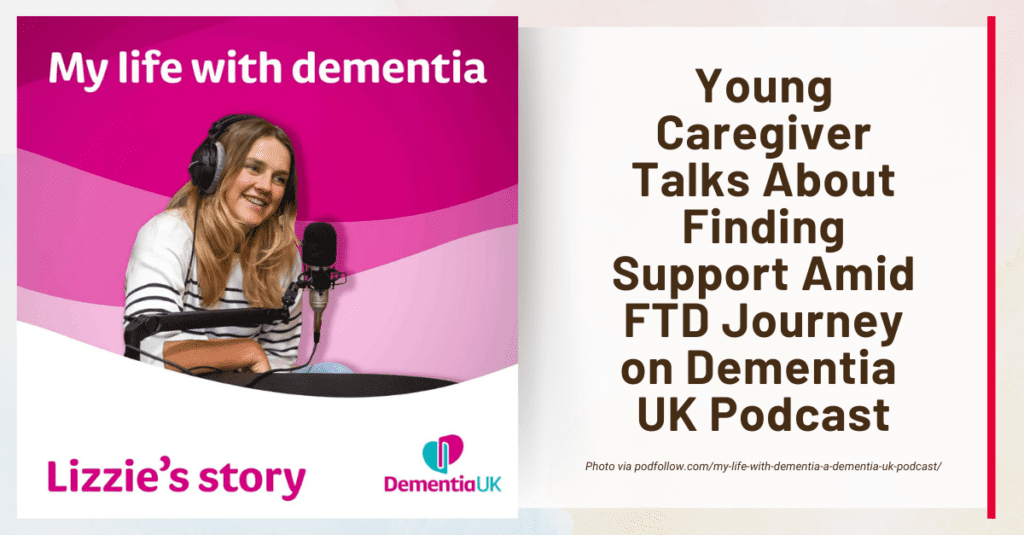Una joven cuidadora habla sobre cómo encontró apoyo en medio de su experiencia con la enfermedad de Traumatismo Frontotemporal en el podcast Dementia UK

Una joven cuidadora de FTD llamada Lizzie habló sobre el dolor, la incertidumbre y las responsabilidades inesperadas que enfrentó mientras cuidaba a su padre, todo mientras atravesaba los cambios naturales de la adultez joven, en una entrevista reciente con “Mi vida con demencia”, un podcast producido por la organización Dementia UK.
Cuando Lizzie se graduó de la universidad, se mudó a Londres para comenzar su carrera como desarrolladora de productos en la industria de la moda. Su padre, Rob, tenía comenzó a actuar de manera inusual, pero la familia no le prestó demasiada atención a su cambio de comportamiento hasta que se perdió conduciendo durante unas vacaciones familiares en Canadá. Lizzie y Rob se derrumbaron, reconociendo que algo importante estaba sucediendo. Pero dado que Rob era relativamente joven, la familia no consideró la posibilidad de demencia hasta que le diagnosticaron la enfermedad cuando Lizzie tenía 25 años.
Buscando apoyo
A medida que la condición de Rob se deterioraba, Lizzie se convirtió en su cuidadora a tiempo parcial para ayudar a su madre. El cuidado de una persona con DFT, combinado con su incipiente independencia y su carrera, ejerció mucha presión sobre Lizzie, y ella dijo que no tenía los apoyos necesarios para ayudarla a sobrellevar la situación. "Hay apoyo para los niños y apoyo para los adultos mayores", dijo, "pero [no] para los adultos jóvenes... especialmente porque es probable que [no] vivan en casa.
“Cuando tenía veinte años, me costó encontrar grupos de apoyo para personas con demencia”, añadió. “Recuerdo que llamaba al médico de cabecera o a grupos de apoyo en Londres y les decía: ‘¿Puedo ir? Necesito apoyo’, pero me rechazaron porque no tenía demencia y no iba a llevar a mi padre”.
Finalmente, Lizzie encontró una solución para brindar apoyo a otros jóvenes y al mismo tiempo ayudarse a sí misma, y llegó de una manera sorprendente.
Ayudar a otros la ayudó
La demencia frontotemporal de Rob hacía que mirara a las personas con una mirada vacía e implacable que los extraños podían interpretar como agresiva. Después de varios encuentros inquietantes, Lizzie creó una camiseta que decía: "Perdón por mirarme fijamente. Es solo mi demencia". Cuando Rob se la puso, la familia vio un cambio inmediato y positivo: los extraños que leyeron la camiseta mostraron compasión y le ofrecieron ayuda.
Reconociendo el valor del mensaje de la camiseta, Lizzie inició “This is Dementia”, una empresa social basada en Instagram que tenía como objetivo generar conciencia sobre la demencia de aparición temprana. También vendió camisetas gráficas y todas las ganancias se destinaron a una organización que brinda atención de enfermería a familias afectadas por la demencia.
“Creé mi propia pequeña burbuja de apoyo a la que la gente podía acudir”, dijo Lizzie. En el proceso, desarrolló su propio apoyo.
Rob murió en la primavera de 2024, ocho años después de que le diagnosticaran demencia frontotemporal. Poco antes de morir, Lizzie publicó en su cuenta de Instagram que iba a cerrar su tienda. “He pensado mucho en cómo puedo seguir ofreciendo apoyo, orientación y concienciando sobre la demencia de aparición temprana... Mi objetivo es seguir defendiendo a quienes viven con demencia y a todos los que se ven afectados por ella... Hay mucho más por venir”.
* AFTD ofrece una Grupo de Facebook para adultos jóvenes de entre 20 y 30 años. que tienen un ser querido con DFT; para unirse, correo electrónico jóvenesadults@theaftd.org e incluya la dirección de correo electrónico que utilizó para abrir su cuenta de Facebook.
Por categoria
Nuestros boletines
Mantente informado
Regístrese ahora y manténgase al tanto de las últimas novedades con nuestro boletín informativo, alertas de eventos y más...
